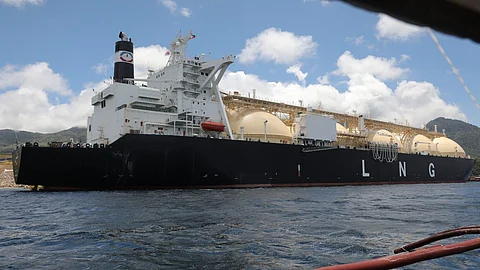
- NEWS
- the EDIT
- COMMENTARY
- BUSINESS
- LIFE
- SHOW
- ACTION
- GLOBAL GOALS
- SNAPS
- DYARYO TIRADA
- MORE

A sustainability think tank's forecast of increased shipping traffic in Verde Island Passage raises the risk of adverse environmental impact on the main shipping route between Manila, Visayas and Mindanao known for its rich marine biodiversity.
In a statement on Wednesday, the Center of Energy, Ecology, and Development or CEED said the VIP is an emerging epicenter of fossil gas buildout in the country with the eight gas-fired power plants and one liquefied natural gas terminal operating in nearby Batangas and the proposed construction of eight more LNG terminals in the province.
"The VIP has long been under shipping pressure because of its strategic position in local and international ports. But the Philippine government's push for gas and its vision of being an LNG Trading and Transshipment Hub of Asia-Pacific has swung open the floodgates for massive plans for gas and LNG in one of the most biodiverse underwater gems in the world. One cannot be alarmed at the VIP potentially buckling under the immense weight of fossil fuel activities on its waters," Gerry Arances, executive director of CEED, said.
In 2022, a total of 76,226 vessels sailed between Batangas, Mindoro and Marinduque, passing through VIP.
The CEED report says that up to 387 vessels will be added to the annual shipping traffic in VIP if all existing and proposed fossil gas plants in Batangas are to come online. The forecast traffic includes LNG tankers that will deliver the projected LNG demand.
Considering only the existing gas plants, up to 85 LNG tankers could potentially be added to annual shipping traffic, according to the report.
By 2024, if the Batangas EERI Combined Cycle Power Plant U1, 2, 3, and 4 comes online as scheduled, up to 128 LNG tankers could potentially be added to annual traffic. It could grow to 166 by 2027 if the VIRES LNG-Fired Power Plant Barge and the ACEN-led BCE Natural Gas-Fired Power Plant also come online.
"The projections are gloomy: The center of the center of marine shore fish biodiversity in the world will be turned into a conduit of dirty energy. Increased shipping traffic is only a glimpse of the threats from the LNG boom — it is also necessary that we look into the destructive activities attributed to this industry. The VIP and resident coastal communities will suffer from a plethora of potential impacts from pre-construction, construction, and operational phases of the massive gas boom," Father Edu Gariguez, lead convenor of Protect VIP, a coalition advocating for the protection of the so-called "Amazon of the oceans," said.
Gariguez clarifiess that they do not oppose VIP as a vital shipping and trade route, but recommend balancing maritime activities to safeguard its marine habitats and resources.
